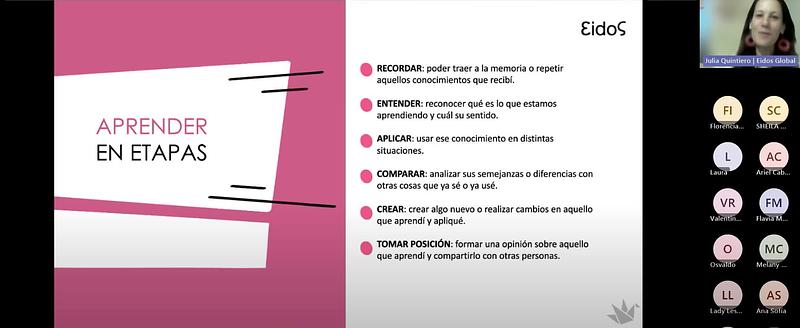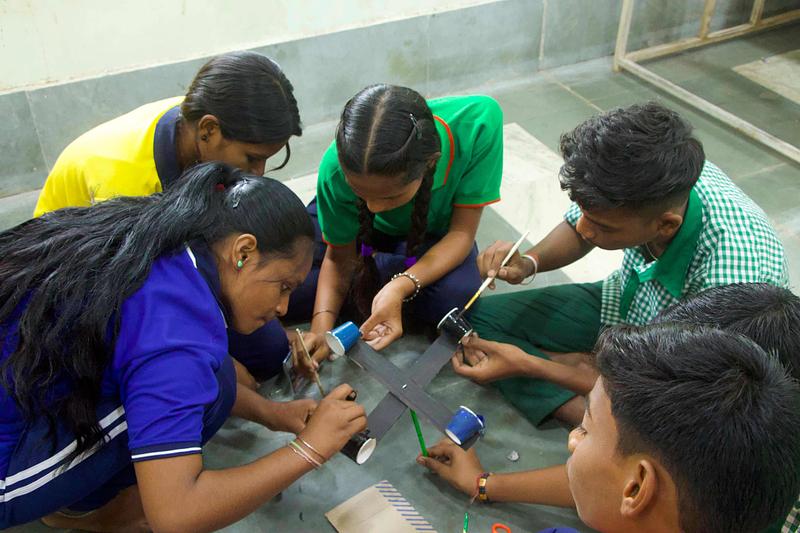According to the World Economic Forum’s 2023 report on the Future of Jobs, employers anticipate a structural labour market churn of 23% of jobs in the next 5 years. Education must shift in response to these changing demands. For example, the fastest growing roles today are anticipated to be driven by technology, digitalization and sustainability.
Equip students with essential digital skills

Habilidades para el futuro online training
Eidos Global recognises the importance of digital skills to increase employability of vulnerable individuals. Their Habilidades para el futuro (in English: Skills for the Future) programme trains trainers on foundational digital skills, giving them tools to deliver courses that empower individuals with essential digital competencies, thereby improving employment prospects.
“Our programs encourage individuals to take their first steps into digital technologies, motivate them to persist in their learning journeys, and provide tools that enable them to work with the socioemotional skills required to tackle upcoming challenges, “ explains Marina Pistarini, Relationships & Development Chief Officer of Eidos Global.
Emphasize learning of critical skills linked to employability
WEF’s Future of Jobs Report 2023 also highlighted that employers view analytical thinking, creative thinking, resilience, motivation, and curiosity as the most important skills for the workplace.
"At MakerGhat, our makerspaces are not just creative hubs, they are transformative platforms for employability and future skills. In these spaces, students discover the freedom to experiment in a safe environment, fostering resilience and adaptability, essential in today's job market.”
MakerGhat aims to equip students in India with these critical skills linked to employability by building low-cost makerspaces, evidence-based curriculum, and robust teacher training programmes. Through a safe physical space, local mentors, and project resources aligned with STEM syllabus concepts, their makerspaces build a foundation of skills and attitudes for the employability of their students.

Students in MakerGhat programme
These makerspaces are effective because they provide tangible results and are aligned with the local context. "At MakerGhat, our makerspaces are not just creative hubs, they are transformative platforms for employability and future skills. In these spaces, students discover the freedom to experiment in a safe environment, fostering resilience and adaptability, essential in today's job market, " explains Azra Ismail, Co-Founder of MakerGhat.
Support students in making career choices
Even if students are well equipped and ambitious for their future career prospects, OECD’s 2018 PISA report shows that students are poorly prepared with the individual agency to make decisions on transitions between schooling and the workplace. Young people typically have less understanding, less experience and fewer useful contacts in searching for work and need greater support to help them make career decisions.
Career Quest is a simple gamified solution for young people to practise decision-making on future career paths. In the game, players help different characters make decisions to solve dilemmas in their career exploration journey, allowing them to practise decision making repeatedly. This process broadens students’ understanding of career decision making as a lifelong process rather than one time choice. Students learn that every decision the player makes for the character influences personal satisfaction, economic satisfaction, and social acceptance.
Student playing Career Quest
Through role play, students learn about the different skills needed in the career exploration process. Through the characters’ different backgrounds, students also learn to empathise with them and reflect on their personal experiences.
“Asmita’s character taught me to be confident the way I am”
For example, Vamshika, a 9th standard girl from rural Bangalore, reflected on her experience playing as the transgender character, Asmita: “Asmita’s character taught me to be confident the way I am. Parents might not be supportive of everything I say but I realized that convincing them is also a skill that I have to learn. I got to know more about transgender community through Asmita, how difficult their life can be even though they have equal rights as everyone else. Asmita is a courageous girl and I realized through the character that I have to be courageous enough to question if I have to move forward in my career”
Want to learn more about impactful education innovations? Check out the 2024 Global Collection report.
Working on your own innovation? Submit your innovation to be considered for the next collection.
Header photo credit: MakerGhat




